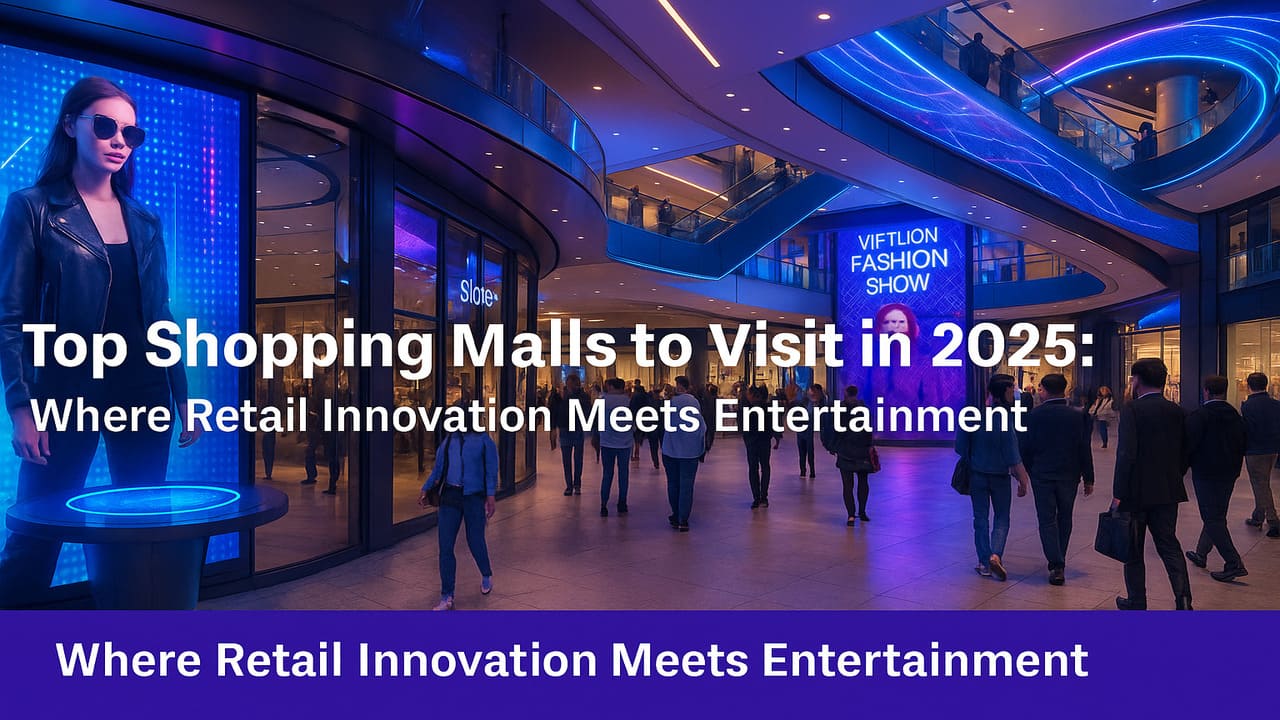
The Berkshire Mall – As the global retail landscape continues to evolve, shopping malls are no longer just about stores and sales. In 2025, Top Shopping Malls around the world are setting new benchmarks by blending cutting-edge retail innovation with immersive entertainment experiences. These modern hubs are transforming into lifestyle destinations where visitors come not only to shop, but to dine, play, relax, and connect.
From Asia to the Middle East, and Europe to North America, malls are now designed as multi-sensory environments. Whether you’re watching a drone show in Dubai or experiencing augmented reality (AR) fashion in Singapore, these malls prove that the future of retail is experiential. Let’s explore the most exciting shopping malls that have captured the world’s attention in 2025.
Still reigning as one of the top shopping malls in the world, The Dubai Mall continues to redefine grandeur. In 2025, it’s not just about the 1,200+ stores or the largest indoor aquarium it’s about the seamless fusion of retail innovation and high-tech entertainment.
The mall now features AI-guided personal shopping assistants that follow you via smart wearable tech. Want to find the latest sneaker drop or compare prices across five stores? Your digital assistant has you covered. Meanwhile, the newly expanded VR Park introduces next-level immersion with zero-latency gaming, interactive hologram battles, and even AR fashion trials powered by generative AI.
Entertainment zones include pop-up esports arenas, celebrity meet-and-greet zones, and TikTok-friendly “content studios” where influencers can film in stylized sets. It’s no longer just shopping it’s a full-blown production.
Read More : Sunsets on the Mississippi: Why Muscatine Riverfront Keeps Locals Grounded
Thailand’s ICONSIAM remains at the forefront in Southeast Asia, earning its spot among the top shopping malls for blending local heritage with futuristic retail tech. In 2025, the mall showcases floating digital markets using projection mapping and sensory elements. It allow customers to interact with traditional Thai experiences in new, engaging ways.
Visitors can use multilingual AI kiosks to learn about the origin of each product and watch 3D recreations of artisans at work. Meanwhile, a smart layout system helps manage foot traffic by tracking crowd density in real time. Rerouting visitors through alternate paths all aimed at improving comfort without disrupting the flow.
Entertainment offerings include the ICONIC Multimedia Water Feature Show. Which now integrates real-time social media feeds into its projection surface. ICONSIAM allowing viewers to see their posts appear in the water display.
In the UK, Westfield London has pushed hard toward becoming a smart mall. By 2025, this flagship location is powered by AI and IoT integration at every touchpoint. Shoppers are greeted with facial recognition-enabled welcome messages. While customized offers are delivered through the Westfield app based on behavior, past visits, and personal preferences.
Stores here are fully phygital physical meets digital. You can try on clothes using smart mirrors, checkout via palm-scan technology, and have your purchases delivered to your home before you leave the mall.
As for entertainment, the Westfield SkyDome is a sensation: a fully enclosed projection ceiling that runs artistic visual displays curated by global artists. From live-streamed concerts to Northern Lights simulations, the SkyDome has become a tourist attraction in itself.
Read More : More Than Shopping: Discover the Secret Perks of Visiting The Berkshire Mall
Lotte World Mall in Seoul stands out for its emphasis on play-driven retail innovation. Targeting Gen Z and younger millennials, the mall combines gaming culture, K-pop fandom, and social media entertainment in a seamless format.
Its newest attraction, the “Lotteverse,” is an AR-enhanced zone where you can scan QR markers and unlock mini-games, digital collectibles, or coupons from partnered brands. Popular fashion outlets now offer “Style Duels,” where shoppers style mannequins and get votes in real-time for mall-wide recognition and prizes.
The entertainment component goes even deeper the mall now features K-Culture Pods, immersive booths where visitors can take part in virtual concerts. AI-generated K-pop music videos with personalized avatars, and interactive dance challenges projected on LED floors.
One of the most entertainment-heavy top shopping malls in North America. American Dream in New Jersey continues to amaze in 2025. Already home to an indoor ski slope, water park, and amusement rides, the mall has recently opened “DreamScape City”. An indoor experiential district designed like a futuristic city.
Here, visitors can ride autonomous pods through themed areas, attend AI-powered fashion shows. Or just visit the MetaExperience Lab a collaboration between retail giants and metaverse developers. They allows users to design and test digital fashion before purchasing real-world versions.
The mall also emphasizes sustainability through smart HVAC systems. Eco-conscious design, and a closed-loop waste management facility that supports local reuse businesses and pop-up brands.
Rather than ending this exploration with a traditional conclusion, it’s worth diving into one of the key drivers behind the transformation of shopping malls in 2025: the rise of retail technology startups.
From AI-powered store analytics to immersive AR shopping lenses, startups are fueling the growth of retail innovation. Companies like SpheraTech (specializing in interactive mall maps), StyleSync (smart fitting room software). And CrowdLite (footfall and sentiment analysis through heatmaps) are helping malls become smarter and more responsive.
Malls are also partnering with entertainment tech firms to build custom VR environments and gamified brand experiences. The synergy between retail developers and startups is creating unprecedented value not only for businesses but for shoppers seeking richer, more personalized mall visits.